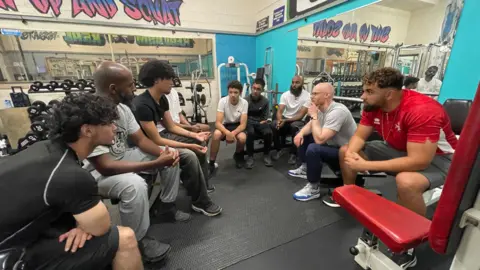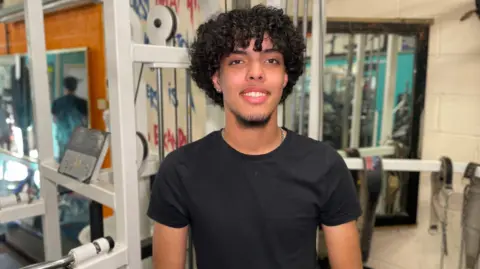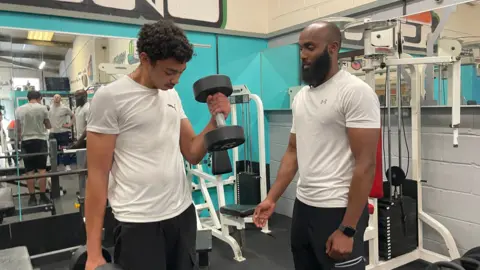Gym-goers quizzed as part of mental health study
 Mark Ansell/BBC
Mark Ansell/BBCGym-goers have been quizzed as part of a university research project focused on the mental health of young men in South Yorkshire.
Evidence suggests that males from minority ethnic groups have "relatively poor engagement" with mental health services, the University of Sheffield scheme said.
Attendees at the Unity Gym Project took part in the study, with results suggesting young men felt more comfortable about opening up in informal settings.
"Community resources like this gym, that young men can access on their own terms and in their own time, are particularly important for those who anticipate feeling misunderstood by professional services," said Dr Will Mason, project lead.
Dr Mason hopes the work will raise the profile of community services like the Unity Gym Project and boost investment.
The Broomhall-based charitable organisation was established in 2010 to engage with those who "often do not have access to mainstream services", it said.
A collaborative approach to the study meant gym users themselves came up with several of the questions asked during the research.
Participant Zac, 17, said the experience was very different from what he expected.
"I was thinking it was going to be like school and I'll have to sit down with a piece of paper and tick boxes," he said.
"But it was just normal conversations, it's what we should be having more of, especially men."
 Mark Ansell/BBC
Mark Ansell/BBCDr Mason trained the gym's strength and conditioning coach, Osman Jama, to conduct part of the research.
Mr Jama thinks the gym space allows men to have more open conversations.
"One of the main points is that the gym is not labelled as a mental health service, so it takes away that element of you're receiving treatment," he said.
"You're in a space where you're unwinding and de-stressing."
Allowing participants to guide the study made teenagers more engaged and honest in their responses, the project said.
"They made it feel like they're here for you and not just the research, said 16-year-old participant Tybias.
"They connected on a deeper level."
 Mark Ansell/BBC
Mark Ansell/BBCDiscussing male mental health, Zac said: "I feel like it can be taboo.
"It's hard for men to emotionally support each other and ask for help because they want to fix it themselves."
Researchers recently presented their findings during a conference at the ISRAAC Somali Community Association centre in Sheffield.
Summing up the research findings, Dr Mason said: "Men feel like they can be open [at the gym], can be their full selves and be honest with the people around them.
"When something is happening for them in their lives, they know this space is here, there's community workers here and it's somewhere they can come to access that type of support."
Listen to highlights from South Yorkshire on BBC Sounds, catch up with the latest episode of Look North.
